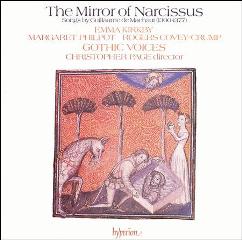Guillaume de Machaut - The Mirror of Narcissus (1987)
Guillaume de Machaut - The Mirror of Narcissus (1987)

1. Dame, de qui toute ma joie vient - ballade 2. Foy porter - virelai 3. Dame, je sui cilz-Fins cuers doulz - motet 4. Tuit mi penser - virelai 5. Dame, mon cuer en vous remaint - rondelet 6. Dame, a qui - virelai 7. Biaute qui toutes autres pere - ballade 8. Je vivroie liement - virelai 9. Rose, liz, printemps, verdure - rondeau 10. Dame, a vous sans retollir - virelai 11. Amours me fait desirer - ballade 12. Douce dame jolie - virelai 13. Inviolata genitrix-Felix virgo-Ad te suspiramus – motet Emma Kirkby (soprano) Gothic Voices Christopher Page (conductor)
The story of Narcissus, who fell in love with his own reflection, fascinated medieval courtiers, for narcissism was the essence of court life and art. All was self-regarding, luxuriant, elitist; and few courtly artists were more concerned with their own reflection than the celebrated poet and composer Guillaume de Machaut.
We know a good deal about the man who looked into the mirror. He was born around 1300, and his career opened with high affairs and travel when he joined the household of John of Luxembourg, King of Bohemia, c1323. He served the king as his secretary until the disaster at Crécy where the chivalrous monarch was slain. During these years of service Machaut became established as a leading poet (one of his foreign admirers was Geoffrey Chaucer) and as the foremost composer of the French Ars Nova. Some time around 1340 he took up a canonry at Rheims—perhaps moving into the spacious house on the Rue de la Pourcelette (now the Rue d’Anjou) which he is known to have occupied in 1372—and until his death his services were sought by the highest patrons of France including John, Duke of Berry, and Charles of Navarre, the future King Charles V.
Machaut wanted his life’s work to be seen as one luxurious artefact of poetry and music, and he arranged for it to be copied as such—an exceptional thing for a fourteenth-century composer to have done. When we turn the pages of the manuscripts which descend from Machaut’s own ‘livre’ we see luminescent paintings, page after page of fine penwork lavished on music and poetry of the highest finish—calligraphic beauty enveloped in an aura of latent sound. Machaut looked into the mirror of Narcissus and an idealized, gilded image of the lover-artist looked back. Machaut fell in love with the reflection and his passion drove him through a long and immensely productive life.
By the standards of any age, Machaut is a compelling and extraordinary composer. His harmonies range from the mellifluous, through the exotic, to the bizarre; rich chords alternate with pungent dissonances which often resolve in the most unexpected ways; his melodies surge and leap. All of these things make him perhaps the most difficult composer of the Middle Ages, but also one of the most enticing; he has so much in common with the composers of today. ---Christopher Page, hyperion-records.co.uk
download: uploaded anonfiles mega 4shared mixturecloud yandex mediafire ziddu








